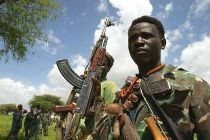Sudan rebels: Won’t disarm until Darfur secure once more
DOW JONES NEWSWIRES
ABUJA, Nigeria, Aug 24, 2004 (AP) — Darfur peace talks made little headway Tuesday as Sudanese insurgents insisted they wouldn’t lay down their weapons until pro-government Arab militiamen stop targeting largely black African civilians in their country’s troubled western region.
 The rebel’s refusal to disarm came after a senior Sudanese official rejected the idea of an African peacekeeping mission to Darfur, where more than 30,000 people have been killed in an 18-month conflict and an estimated 1.2 million pushed from their homes.
The rebel’s refusal to disarm came after a senior Sudanese official rejected the idea of an African peacekeeping mission to Darfur, where more than 30,000 people have been killed in an 18-month conflict and an estimated 1.2 million pushed from their homes.
“We’re an independent movement and we’re fighting for our people and our rights. This force is our guarantee, how can we disarm them?” said Abdelwahid Muhamed El Nur, chairman of the Sudan Liberation Army rebel group.
The talks in Nigeria are an attempt to resolve the crisis in Darfur before the U.N. Security Council’s Aug. 30 deadline for Khartoum to disarm the Arab militia known as Janjaweed or face economic and diplomatic sanctions.
“The Janjaweed are carrying out ethnic cleansing and genocide. If there is a security arrangement, disarmament will come gradually. But now we are not ready to speak about disarmament,” El Nur said before the African Union-sponsored talks got under way again Tuesday.
Nigerian President Olusegun Obasanjo, who is also the AU chairman, pressed both sides to comprise, saying rebel disarmament is a key to lasting peace while warning the government against resisting an international presence in Darfur.
“One thing that will be a real disaster is for the international community to feel absolutely dissatisfied with the handling of events by the government of Sudan to the extent that they will have to unleash more than even what we are asking for,” he told reporters.
“That would be a tragedy…for the people of Africa,” he said without elaborating.
Sudanese government representatives to the talks didn’t speak with reporters before entering the closed-door meetings.
But a senior Sudanese official Monday dismissed an AU proposal to send nearly 2,000 peacekeepers to Darfur. It was an apparent setback to the international community’s hopes that the union could quickly devise an African solution to the conflict, which the U.N. has called the world’s worst humanitarian crisis.
There are 150 AU troops from Rwanda in Darfur protecting some 80 union monitors observing a largely ignored cease fire between the government and rebels. But the troops are operating under a vague mandate that doesn’t spell out how far they can go to protect targeted civilians.
Obasanjo said all sides at the talks had agreed on an agenda and that the conference would continue – despite being originally planned for only a single day. He didn’t say how long the talks would last.
In Darfur Tuesday, U.K. Foreign Secretary Jack Straw said it is critical the government establish “safety and security across Darfur and get the political process going.” He spoke from Abu Shouk, a sprawling refugee camp set in desert and scrubland 2 kilometers from the town of al-Fasher in Darfur.
The rebels at the talks also complained that the government was refusing to address the political causes of the conflict.
“We ask them (the government) clearly: ‘Have you taken the strategic position to engage us politically?’ We have the answer that the government is not ready,” said Ahmed Hussain Adam, a spokesman for another Darfur rebel group, the Justice and Equality Movement.
The violence in Darfur stems from long-standing tensions between nomadic Arab tribes and their African farming neighbors over dwindling water and agricultural land. Those tensions exploded into violence in February 2003 when two African rebel groups took up arms over what they regard as unjust treatment by the government in their struggle with Arab countrymen.
The Janjaweed’s actions amount to a massive retaliation, although the Sudanese government denies that it is backing the militia.
Aid groups and both houses of U.S. Congress have called the crisis in Darfur “genocide,” but the AU and the U.N. have stopped short of calling it that.
